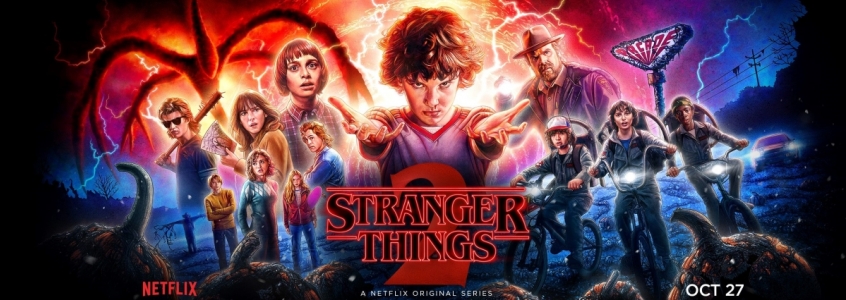The spooky, nostalgic and thoroughly charming Stranger Things returned to audiences last week, with season two of Netflix's surprise hit airing in time for the Hallowe'en season. Some Christians may be suspicious of horror and drama that delves too far into darkness, but they should rest assured that this show is nothing to fear. Stranger Things isn't just quality entertainment, but a provocative and spiritually wise fable for a secular age.

Set in the 1980s in the fictional town of Hawkins, Indiana, Stranger Things is the story of small town invaded by monsters, mystery and well, strange things a-happenin'. One of the reasons it succeeds so well is its talented cast, particularly the five (six in season two) children at the heart of its story. Child actors are a well-documented risk in Hollywood, but in this show you never find yourself wincing at over-acting or a lack of maturity, the characters soon feel familiar and eminently likeable, and show moving emotional depth.
By nailing this aspect, the show offers a precious insight: the perspective of naïve, youthful innocence in an adults' murky world. The children are put in stark contrast to their parents, who practically slumber through the strange goings on in Hawkins. Only the curiosity of the kids (and some adults) is keen enough to see what's taking place. As lovers of sci-fi and Dungeons & Dragons, they know the supernatural world well – so when the real thing shows up, they're ready.
Jesus famously elevated children as those to whom the Kingdom of God belonged. He encouraged his disciples to have faith like a child – why? Perhaps part of the answer is that combination of optimism and imagination – a desire to learn and explore rather than assume you've already got all the answers. As knowingly dependent creatures, children understand trust – and trust is central to true faith.
In contrast cynicism, narrow-mindedness and a desire for control frequently stand in the way of faith –and these are the marks of adulthood.
Through the lens of wide-eyed children Stranger Things invites us to consider that there's more going on than we can see and that there are vast powers at work even in the midst of our everyday lives. No, this isn't a show with Christianity or any kind of religion at its core, but it doesn't need to be.
We live in a highly secularised world in which we rarely lift our eyes to the unknown and the infinite. The idea of God can seem implausible and uninteresting. Despite that, the immense popularity of this Netflix show has displayed a public appetite for wonder and the spectacular. Of course, audiences know it's not 'real', but Christians should consider Stranger Things to be significant art because it nonetheless invites a renewed perspective on reality.
And a world of dark powers, gifted individuals and profound mystery should be deeply familiar to the Christian mind. Believers attest to a world divinely made but corrupted by evil; under threat of darkness but not without hope of supernatural salvation. Intentional or not, Stranger Things offers a creative riposte to materialists who say that *this* is all there is. It's what writer Alan Noble calls a 'disruptive witness' to a world asleep. What if its story is not mere escapism, but an attempt to paint the world as it really is?
The Duffer brothers (the show's creators) have wisely pitched a show that points to darkness, but doesn't indulge in it. It balances scares and real threat with refreshing levity and endearing heart. It also teaches about the value of deep friendship, family and self-sacrifice – while warning about humankind's penchant for deception and abuse of power.
Through all these it proves rich storytelling, ripe for theological reflection in a world that's frequently bored and uncompelled by the 'strange'. Its vibrant and wistful 80s aesthetic invites us to look back. But Stranger Things also does more – it gets us looking up.
Both seasons of 'Stranger Things' are now streaming on Netflix. You can follow @JosephHartropp on Twitter.













